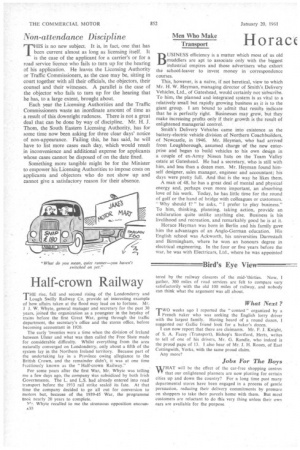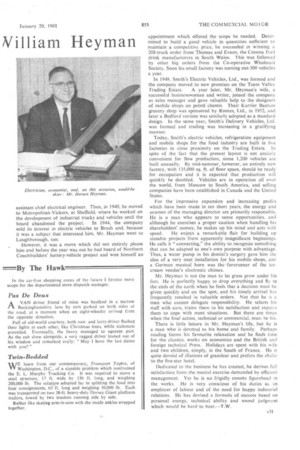Horm William Heyman
Page 32

Page 33

If you've noticed an error in this article please click here to report it so we can fix it.
BUSINESS efficiency is a matter which most of us old muddlers are apt to associate only with the biggest industrial empires and those advertisers who exhort the school-leaver to invest money in correspondence courses.
This, however, is a naive, if not heretical, view to which Mr. H. W. Heyman, managing director of Smith'sIDelivery Vehicles, Ltd., of Gateshead, would certainly not subscribe. To him; the planned and integrated system is as vital to a relatively small but rapidly growing business as it is to the giant group. I am bound to admit that results indicate that he is perfectly right. Businesses may grow, but they make increasing profits only if their growth is the result of enlightened managerial control.
Smith's Delivery Vehicles came into existence as the battery-electric vehicle division of Northern Coachbuilders, of Newcastle, in 1946. Mr. Heyman, who had arrived from Loughborough, assumed charge of the new enterprise and began to build vehicles to his own design in a couple of ex-Army Nissen huts on the Team Valley estate at Gateshead. He had a secretary, who is still with him, and less than a dozen men. Mr. Heyman found himself designer, sales manager, engineer and accountant; his days were pretty full. And that is the way he likes them.
A man of 48, he has a great deal of mental and physical energy and, perhaps even more important, an absorbing love of his work. Today, he has little time for the round of golf or the hand of bridge with colleagues or customers. "Why should 1?" he asks, "I prefer to play business." To him, thinking, planning, taking action, provide an exhilaration quite unlike anything else. Business is his livelihood and recreation, and remarkably good he is at it.
Horace Heyman was born in Berlin and his family gave him the advantages of an Anglo-German education. His English school was Ackworth, his universities Darmstadt and Birmingham, where he won an honours degree in electrical engineering. In the four or five years before the war, he was with Electricars, Ltd., where he was appointed assistant chief electrical engineer. Then, in 1940, he moved to Metropolitan-Vickers, at Sheffield, where he worked on the development of industrial trucks and vehicles until the board abandoned the project. In 1944, the company sold its interest in electric vehicles to Brush and, because it was a subject that interested him, Mr. Heyman went to Loughborough, too.
However, it was a move which did not entirely please him and before the year was out he had heard of Northern Coachbuilders' battery-vehicle project and won himself an
appointment which offered the scope he needed. Determined to build a good vehicle in quantities sufficient to maintain a competitive price, he succeeded in winning a 208-truck order from Thomas and Evans, the Corona fruit drink manufacturers in South Wales. This was followed by other big orders from the Co-operative Wholesale Society. Soon his small factory was turning out. 300 vehicles a year.
In 1949, Smith's Electric Vehicles, Ltd., was formed and the company moved to new premises on the Team Valley
Trading Estate. A year later, Mr. Heyman's wife, a successful businesswoman and writer, joined the company as sales manager and gave valuable help to the designers of mobile shops on petrol chassis. Their Karrier Bantam grocery shop was sponsored by Rootes, Ltd., in 1952, and later a Bedford version was similarly adopted as a standard design. In the same year, Smith's Delivery Vehicles, Ltd. was formed and trading was increasing in a gratifying manner.
Today, Smith's electric vehicles, refrigeration equipment
and mobile shops for the food industry are built in five factories in close proximity on the Trading Estate. In spite of the fact that the present layout is not entirely convenient for flow production, some 1,200 vehicles are built annually. By mid-summer, however, an entirely new factory, with 135,000 sq. ft. of floor space, should be ready for occupation and it is expected that production will quickly be doubled. Vehicles are in operation all over the world, from Moscow to South America, and selling companies have been established in Canada and the United States.
For the impressive expansion and increasing profits which have been made in ten short years, the energy and acumen of the managing director are primarily responsible. He is a man who appears to sense opportunities, and although he exercises a proper caution when handling his shareholders' money, he makes up his mind and acts with
speed. He enjoys a remarkable flair for building up sizeable projects from apparently insignificant beginnings. He calls it "connecting," the ability to recognize something that can be adapted to one's own purpose with advantage. Thus, a water pump in his dentist's surgery gave him the idea of a very neat installation for his mobile shops, aru.i a German musical horn was the forerunner of the icecream vendor's electronic chimes.
Mr. Heyman is not the man to let grass grow under his feet. He is perfectly happy to drop everything and fly to the ends of the earth when he feels that a decision must be given quickly and on the spot, and his timely arrival has frequently resulted in valuable orders. Not that he is a man who cannot delegate responsibility. He selects his staff with care, trains them to his satisfaction and expects them to cope with most situations. But there are times when the final action, technical or commercial, must be his.
There is little leisure in Mr. Heyman's life, but he is
a man who is devoted to his home and family. Perhaps reading forms his favourite relaxation and he finds time for the classics, works on economics and the British and foreign technical Press. Holidays are spent with his wife and two children, simply, in the South of France. He is quite devoid of illusions of grandeur and prefers the chalet to the five-star hotel.
Dedicated to the business he has created, he derives full satisfaction from the mental exercise demanded by efficient management. Yet he is no frigidly remote figurehead in the works. He is very conscious of his duties as .1.n employer of labour and of the need for happy industrial relations. He has devised a formula of success based on personal energy, technical ability and sound judgment which would be hard to beat.—T.W.




















































































































